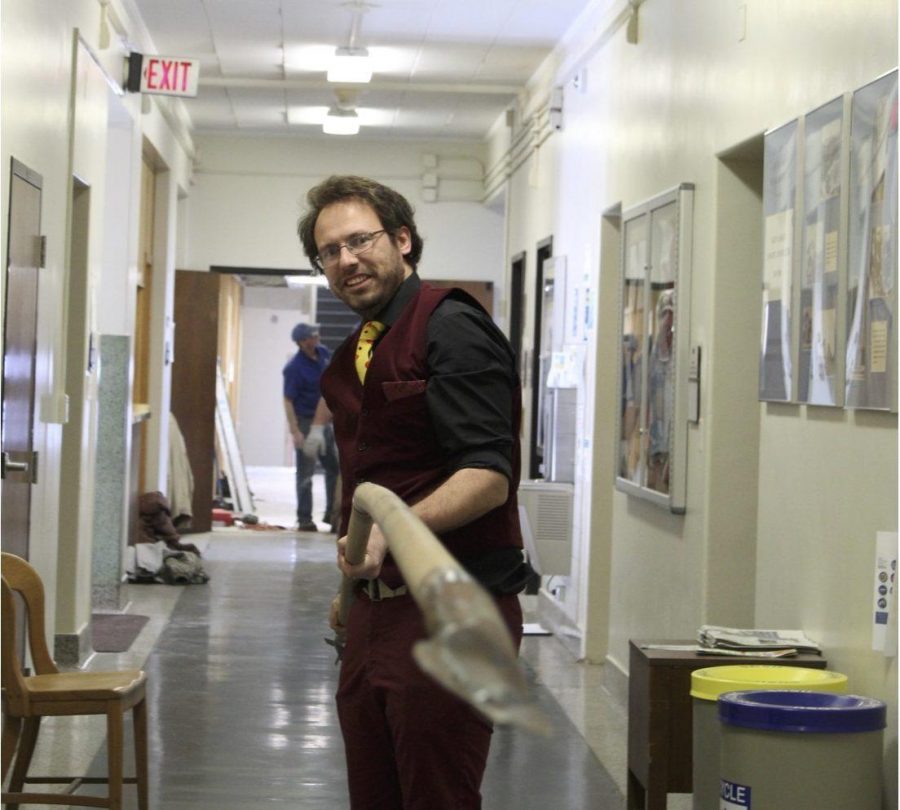The “Five minutes with” series focuses on an SDSU faculty, student or member of the Brookings community. The interviewer spends five minutes speaking with a person to learn their specialty or something they are passionate about.
Q: Do you think that teaching hands-on is the best method?
A: I think it is. All of the students in that class kept coming all the time, they didn’t miss classes because it was actually fun to go and do stuff. You got to see what you did with your hands afterward. You read about weaving and dressmaking and you know these things when you read about history, but you never experience or grasp how hard these things are. Some people went in and discovered they had a talent for weaving. We had one student who had never done it before, but then he decided to make his project weaving and he ended up making, like, a belt and stuff. People discovered that it’s actually quite fun to do these things, really brings to light what you’re doing.
Q: What is the value in teaching ancient Greek military history today?
A: Teaching ancient history in general is that everything comes from there. The further back you go the more you can trace influences. The influences today from Rome are countless: the legal system, the language, through to traditional ways of viewing things. Everything comes from the Greeks, the Romans, even the Egyptians. It’s interesting to compare long-term. People don’t change; the actual characteristics of humans don’t change over time. We’re all human, whether we’re born 4000 years ago or now.You can understand the human experience more from looking at history.
Q: For a student who is interested in taking your classes, what is your recommendation?
A: You have to like learning about the past. Even if you hate ancient history, but you love modern history, you can take modern history classes. The upper-level classes go into detail and you have to be interested in the area. The more general ones, the ones everyone takes are Western Civ I and II or US History I or II, your basic SGR classes. If you do spend the time and read about the history and pay attention to who it is you’re learning about, and where and when and why you’re learning about this stuff, you can actually find parallels to anything in your life. Society is cyclical, you know the old saying you’re doomed to repeat the past if you don’t know what you did wrong. Even if you don’t have a passion for history, you’ll always get something out of it if you take the time to appreciate what the professors and textbooks are trying to convey to you.
Q: What brought you to Brookings?
A: The job market is terrible for professors, especially in history. Of all the people who get Ph.D.s in history, less than 20 percent get a job out of it. You have to make sure, when you’re doing your Ph.D., that you’re doing stuff to make yourself employable. So I knew, being in Canada, it would be very hard for me to get back in the British job market because of the differences in the education systems. I knew I was pretty much limited to North America. I applied for like 45 jobs in one year and the only one that gave me a face-to-face interview was (SDSU). I got two other job interviews, I had one phone interview and one other application where I got to the second round. Three out of 45. It’s just a terrible job market, so you have to really build your resume while you’re in grad school to make yourself as employable as possible.
Q: Where have you lived in your life?
A: I grew up in Nuneaton which is a small town just outside Coventry which is, you know, 20 minutes or so from Birmingham which is the biggest city in the U.K. after London. We moved to South Wales for my dad’s job when I was 10, my parents still live in the same house now 25 years later. I came over here to do my master’s in Canada just because I didn’t want to get a real job — I wanted to carry on being a student and my grades having wasted my time for two years in my undergrad weren’t sufficient to do graduate studies in the U.K. so I took the opportunity, my one single offer, to do grad school in Canada.


















